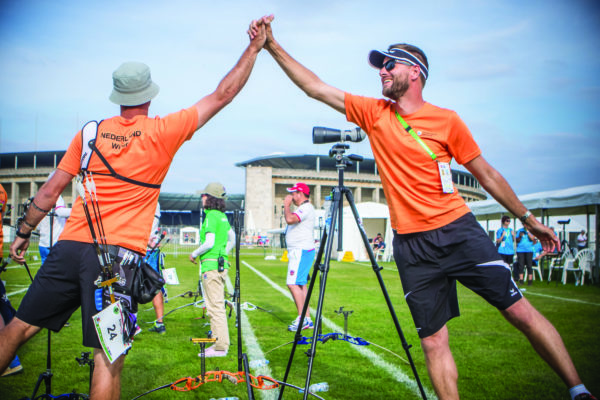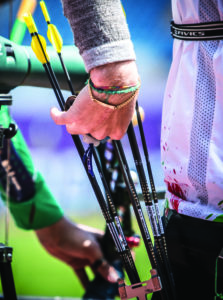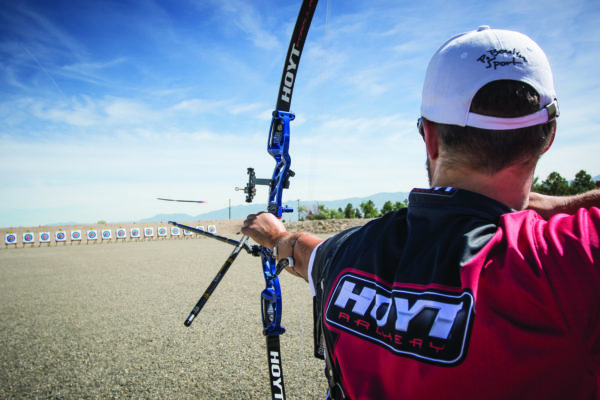Erin Prior shows you how deliberate practice can make training effective.
Many archers see the value in their training sessions to help them prepare physically and perhaps even mentally for their upcoming competitions. However, various other commitments in life can often prevent us from heading down to the field as often as we’d like. But what if there was a way to make your training sessions more effective? To help you get more out of each session, without you having to become increasingly stressed trying to balance the other commitments in your life with your training?
In addition to struggling with time constraints, even the most motivated archers may find that they lack motivation during some training sessions. This often leads to an archer ‘going through the motions’ and simply shooting to get the job done, often with a certain number of arrows in mind. Despite the physical training still being completed, this kind of training session often leads to archers taking little from their practice other than perhaps judging their progress on their results. Consequently, these archers are missing out on the valuable opportunity to maximise learning and development within their training sessions.
With these typical scenarios in mind, Deliberate Practice is a term often used by Sports Psychologists which refers to a more effective way of training by practising with the specific goal to improve performance. This method of training is frequently implemented by many elite-level athletes and teams.
By adopting this technique, archers will not only feel increased motivation during their training sessions, but they will also be able to challenge themselves to develop their skills and performance whilst using their time effectively. As a result, deliberate practice is said to be more efficient as it provides more structure than informal practice.
There are various key elements to undertaking deliberate practice. Each element will now be discussed and will include examples of how archers can adopt this method of practice within their normal day-to-day training sessions.
Repetition
The first aspect of deliberate practice is repetition. This is one thing that archers are definitely used to; however, having ample opportunity for repeating the skill you are trying to master is crucial. This may seem obvious, but it is important to mention that despite deliberate practice making your training sessions more effective and helping you make the most of your time, it is still important for you to practice regularly to develop and refine your skills. Therefore, it is important to consider that deliberate practice doesn’t necessarily mean practising less, it is simply a way to maximise the usefulness of each session.
One of the key ideas behind deliberate practice is focusing on the process rather than the result. This is something that is often explained by sports psychologists and coaches, but it can be difficult to remain focused on technique and process when our goals are often focused on our results.
However, the aim of deliberate practice is for an individual to focus on the various skills they would like to develop and how they are going to develop them. Therefore, whilst results are important, the process that helps you achieve those results is often far more crucial. With this in mind, it is important that you try to develop effective process goals.
Effective Goal-Setting
A practical technique for developing a process focus is to set effective goals for your sessions. Developing these process goals will help you to engage in deliberate practice and get the most out of each training session.
When setting goals for your sessions, firstly consider what you would like to achieve in terms of technique. It may also be beneficial to liaise with your coach on which areas you should be looking to improve. Once you have decided which area of your process you would like to improve (this could be technical or mental), then consider what you need to focus on and how you are going to work towards achieving your process goal.
By setting these goals, you are then able to consider your progress not only in terms of your results, but also in your technical improvements. This often helps archers to prevent putting excessive pressure on themselves, and gives them confidence and enhanced motivation towards practicing and competing in the future.
Challenge Yourself
In addition to repeating the skill you are trying to master, creating opportunities to challenge yourself and stretch your ability during training is key. Therefore, you should try to undertake appropriately challenging tasks with the goal of improving various skills. This is something that typically sets elite athletes apart from novices, as they tend to set themselves challenges that are above their current skill level in order to develop their ability.
In terms of challenging yourself during your training sessions, perhaps think about what skills you would like to develop and how you may be able to get creative in setting yourself tasks and challenges to complete.
Feedback
Feedback is essential to deliberate practice, but it needs to be specific feedback. Therefore, when receiving feedback from your coach (or giving feedback as a coach) try to discuss the finer details to make your sessions most effective. Additionally, consider different methods of feedback – this may come from guidance from coaches, video recording your shots and watching them back or kinaesthetic feedback (reflecting on how your shot felt).
Of course, we can also gain feedback from our results and it can be useful to cross-reference our results with how our shots feel, however, we want to avoid using results as our only method of feedback as this can often apply excessive pressure and prevent us from focusing on technique. Making sure you receive feedback throughout your sessions allows you to measure your progress towards your goals and gives you a focus whilst training – this helps to avoid training with no purpose.
Reflection
Finally, self-reflection is key to getting the most out of your training sessions. Taking the time to reflect on your goals for each session, how you attempted to work towards these goals, whether you feel you achieved these goals and what you would like to focus on going forward, is critical for continual development.
Keeping a shooting diary can be a useful way to keep track of your progress – it can become a source confidence when reflecting on the goals you have achieved, and also gives your coaches more information to work with.
So, next time you’re lacking motivation or you’re not sure how to work towards your goals, give deliberate practice a try to develop more engaging, effective sessions that will improve motivation and your performance.





